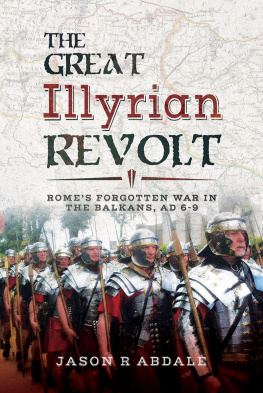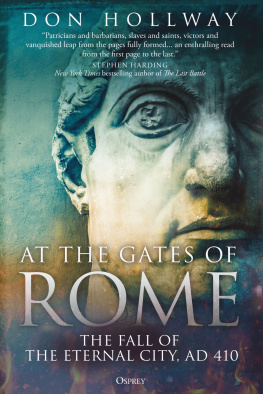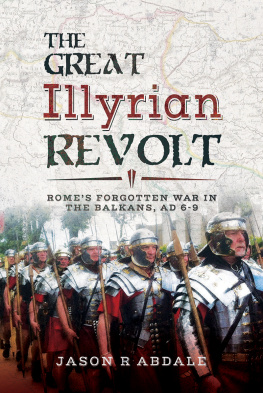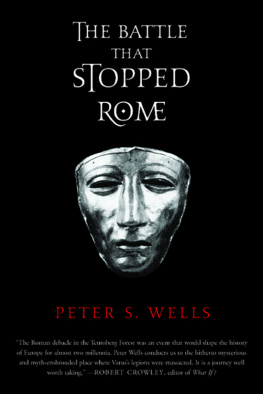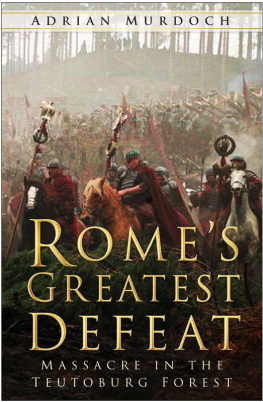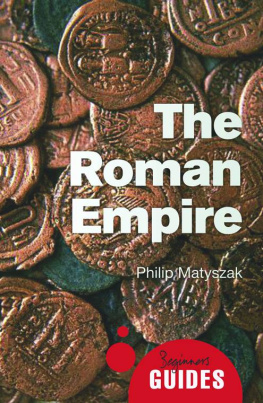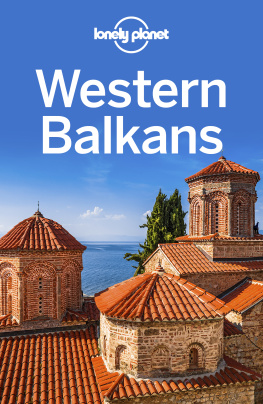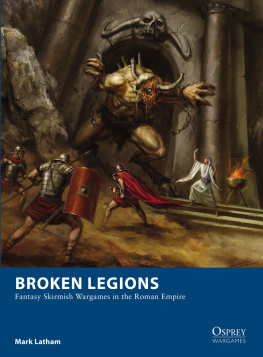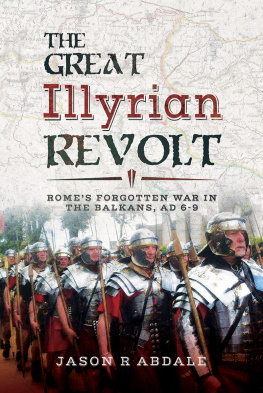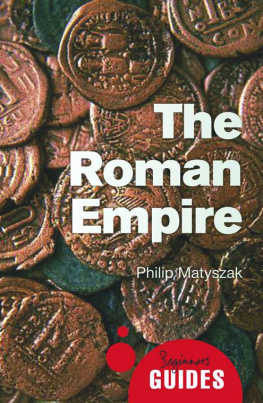The Great Illyrian Revolt
The Great Illyrian Revolt
The Great Illyrian Revolt
Romes Forgotten War in the Balkans, AD 69
Jason R. Abdale

First published in Great Britain in 2019 by
Pen & Sword Military
An imprint of
Pen & Sword Books Ltd
Yorkshire Philadelphia
Copyright Jason R Abdale 2019
ISBN 978 1 52671 817 4
eISBN 978 1 52671 819 8
Mobi ISBN 978 1 52671 818 1
The right of Jason R Abdale to be identified as Author of this work has been asserted by him in accordance with the Copyright, Designs and Patents Act 1988.
A CIP catalogue record for this book is available from the British Library.
All rights reserved. No part of this book may be reproduced or transmitted in any form or by any means, electronic or mechanical including photocopying, recording or by any information storage and retrieval system, without permission from the Publisher in writing.
Pen & Sword Books Limited incorporates the imprints of Atlas, Archaeology, Aviation, Discovery, Family History, Fiction, History, Maritime, Military, Military Classics, Politics, Select, Transport, True Crime, Air World, Frontline Publishing, Leo Cooper, Remember When, Seaforth Publishing, The Praetorian Press, Wharncliffe Local History, Wharncliffe Transport, Wharncliffe True Crime and White Owl.
For a complete list of Pen & Sword titles please contact
PEN & SWORD BOOKS LIMITED
47 Church Street, Barnsley, South Yorkshire, S70 2AS, England
E-mail:
Website: www.pen-and-sword.co.uk
Or
PEN AND SWORD BOOKS
1950 Lawrence Rd, Havertown, PA 19083, USA
E-mail:
Website: www.penandswordbooks.com
Chronology of Events
Approx. 6,000 BC : The earliest recognizable culture within the western Balkans appears.
Approx. 4,500 BC : People living in the western Balkans begin mining, smelting and making objects from copper.
Approx. 1,000 BC : Iron use spreads to the western Balkans. At the same time, the first culture that can be described as proto-Illyrian appears within the region, possibly due to an immigration of Indo-European speakers from Anatolia.
1,000500 BC? : A group of three Illyrian tribes collectively known as the Iapygians crosses the Adriatic Sea and settles within south-eastern Italy in what is now the region of Apulia.
734 BC : The Greeks expel the Liburnian tribe from the island of Corfu (known then as Corcyra). This is the first recorded conflict between the Illyrians and the ancient Greeks.
691 BC : The first war between the Illyrians and the kingdom of Macedon. These two peoples would continue to fight each other for the next 300 years.
400300 BC? : The Iapygians of south-eastern Italy are either conquered or driven out by the expanding Roman Republic.
393 BC : The Dardanian tribe conquers Macedon, and holds it for only one year before being expelled.
229228 BC : The First Roman-Illyrian War. The first time in the historic record when we know that Romans and Illyrians fought each other.
220219 BC : The Second Roman-Illyrian War.
169 BC : The Third Roman-Illyrian War.
167 BC : Southern Illyria becomes a Roman protectorate. Although nominally independent, it is under the domination of the Roman Republic.
156 BC : The Fourth Roman-Illyrian War.
13535 BC : A hundred years of sporadic hostilities between the Illyrians and the Romans.
59 BC : The region of southern Illyria called Dalmatia is changed from being a protectorate to being a Roman province, re-named Illyricum. Northern Illyria, known as Pannonia, is still independent, but under increasing Roman influence.
3512 BC : Gaius Octavianus, later to become Caesar Augustus, launches a series of military campaigns against the Illyrians to bring them under complete subjection, with only partial success.
129 BC : The region of northern Illyria called Pannonia is conquered by Caesar Augustus stepson Tiberius Claudius Nero, and is incorporated into the Roman province of Illyricum. Peace in the region is maintained until 6 AD.
69 AD : The Great Illyrian Revolt, a massive uprising against Roman rule throughout the province of Illyricum. Romans suffer heavy losses, and are forced to commit tens of thousands of troops to the region to suppress the rebellion. Tiberius Claudius Nero and Aulus Caecina Severus lead Roman forces in this war.
Late September, 9 AD : The Battle of Teutoburg. An estimated 10,000 Romans from the 17th, 18th and 19th Legions are killed by the Germanic barbarians, led by Arminius, during a four-day battle in what is now north-western Germany. Soon afterwards, the Germans drive all surviving Romans out of Germania.
10 AD : Rome launches its revenge campaign against Arminius and his rebel forces in Germania. The war lasts for six years; Tiberius leads the legions in the first two years of the war, and then Tiberius nephew Germanicus commands the legions during the remaining four years.
14 AD : Caesar Augustus, Romes first emperor, dies. Tiberius Claudius Nero becomes Romes second emperor and is crowned Emperor Tiberius Julius Caesar. The Roman legions in both Germania and Pannonia mutiny upon Augustus death, and both uprisings are bloodily suppressed.
15 AD : Rebellion breaks out in northern Africa, led by the Numidian warlord Tacfarinas, threatening Romes grain supply.
Late 16 AD : Emperor Tiberius is forced to divert more and more troops to suppress Tacfarinas rebel army in Africa, and so he halts military operations against Arminius and his Germanic rebels.
17 AD : Tiberius and Germanicus hold their triumphal celebrations for their wars against the Illyrian and Germanic rebels. Tiberius son Drusus Castor is appointed governor of Illyricum, and he holds this post for three years.
19 AD : Germanicus suddenly dies, possibly assassinated.
19 or 20 AD : Sometime during Emperor Tiberius reign, the province of Illyricum is split in half into the provinces of Pannonia and Dalmatia.
21 AD : Tacfarinas rebellion in northern Africa is crushed.
37 AD : Emperor Tiberius dies. Gaius Caligula becomes Romes third emperor.
Introduction
W hen people hear the words ancient history, they usually think of Egypt, Mesopotamia, Greece or Rome. This is what I like to call Ancient Historys Big Four, because practically everything that is spoken about in the broad field of ancient history is usually done in relation to one of these four major sub-fields. An incalculable number of books, journals, magazine articles and television documentaries have been produced in relation to these four civilizations. The sheer volume of all of that information will probably destroy your brain.
Once you get beyond the Big Four, then you come across cultures that appear to be of secondary importance. These mostly consist of the civilizations with which one or more members of the Big Four were in contact. Examples would probably be the Nubians, Persians or Celts. There are scholars who devote their entire lives to studying these people and you can find plenty of books about them published in a variety of languages, but its important to know that each one of these civilizations is inextricably linked with one of the major civilizations that form the Big Four. You cant talk about Nubia without talking about Egypt. You cant talk about the Persians without talking about Greece. You cant talk about the Celts without talking about Rome. You see?

